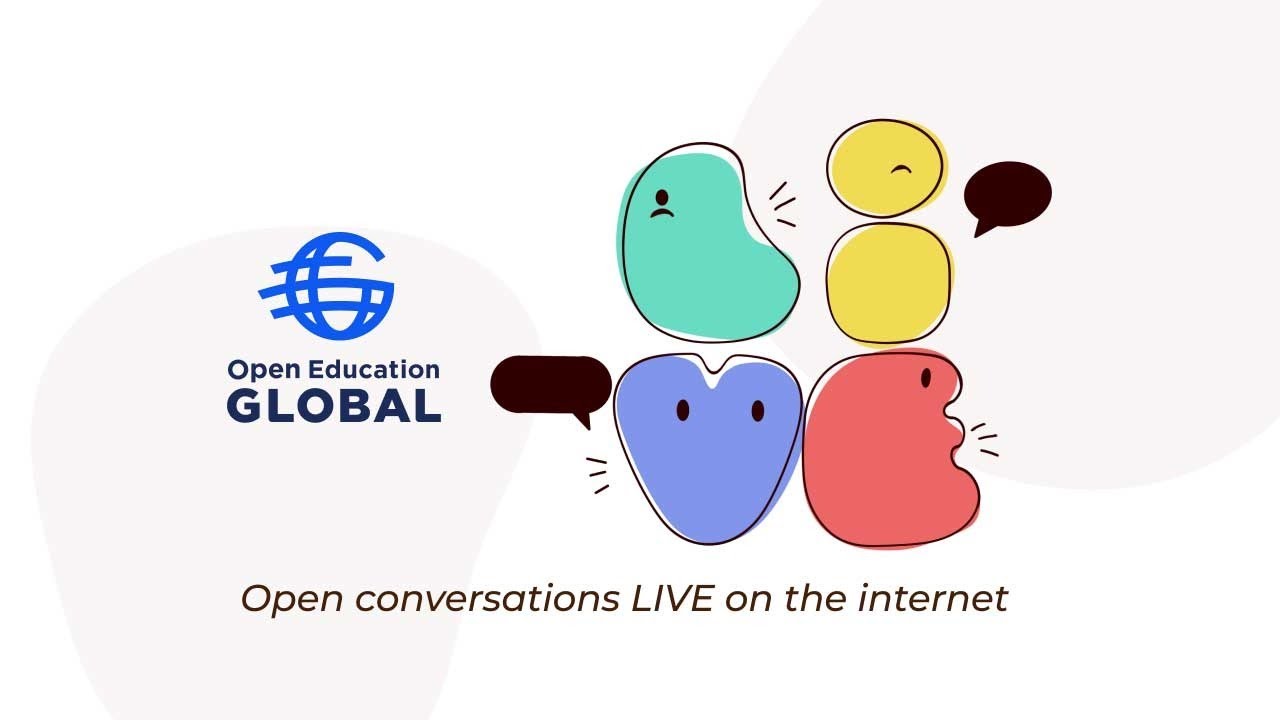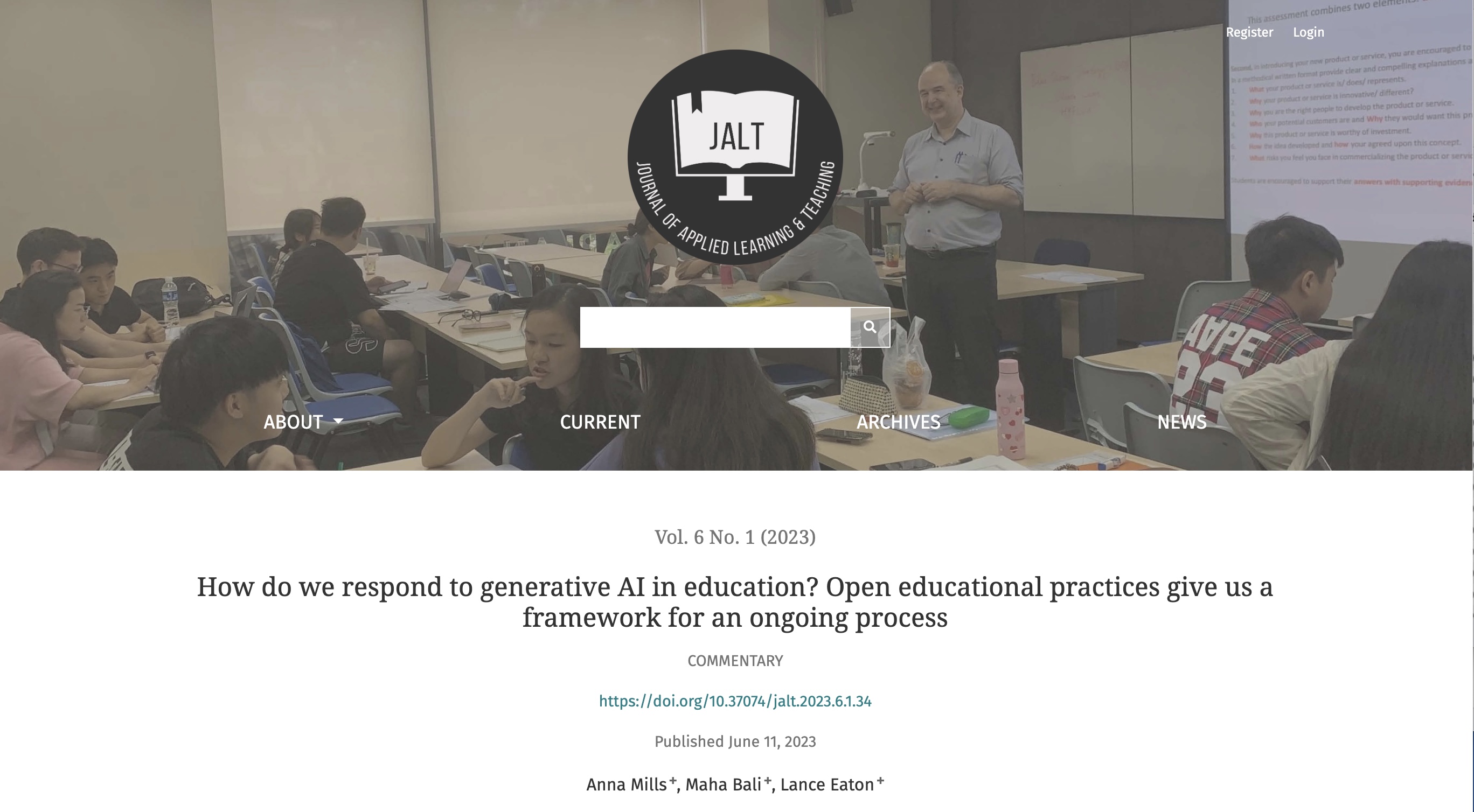Yes there is much discussion, concern, worry about AI in education, and that is a good thing as we seek to share and understand this fast moving trend. That’s why we are very excited to bring you this live, open conversation with three educators – Anna Mills, Maha Bali, and Lance Eaton who speak from their experiences teaching with AI this year.
This is not focused on tools, but what is relevant for us, an approach grounded in the ideas of open educational practices. Our three guests will be sharing from their recently published Journal of Applied Learning and Teaching paper How do we respond to generative AI in education? Open educational practices give us a framework for an ongoing process
When (in your local time): 2023-07-25T17:00:00Z
Watch live or see recording later. No registration required. Participate via the live stream using the chat to ask questions/send comments that can be brought right into the studio.
![]() Wow, we are also streaming at the same time directly to Twitter, you can watch there when @OpenEdGlobal posts that the stream has gone live.
Wow, we are also streaming at the same time directly to Twitter, you can watch there when @OpenEdGlobal posts that the stream has gone live.
Watch live on YouTube, send questions/comments to the studio, or see the recording later
Guests
- Anna Mills @annarmills English Instructor, College of Marin, Kentfield, California, USA
- Maha Bali @mahabali Professor of Practice, Center for Learning and Teaching, The American University in Cairo, Cairo, Egypt
- Lance Eaton, Director of Digital Pedagogy, College Unbound, Providence, Rhode Island, USA
This conversation being offered in conjunction with and participants from MYFest23 (Mid-Year Festival) the “recharge and renewal experience” offered by Equity Unbound.
We highly recommend reading their paper available open access licensed Creative Commons CC-BY!.
With the release of ChatGPT in November 2022, the field of higher education rapidly became aware that generative AI can complete or assist in many of the kinds of tasks traditionally used for assessment. This has come as a shock, on the heels of the shock of the pandemic. How should assessment practices change? Should we teach about generative AI or use it pedagogically? If so, how? Here, we propose that a set of open educational practices, inspired by both the Open Educational Resources (OER) movement and digital collaboration practices popularized in the pandemic, can help educators cope and perhaps thrive in an era of rapidly evolving AI. These practices include turning toward online communities that cross institutional and disciplinary boundaries. Social media, listservs, groups, and public annotation can be spaces for educators to share early, rough ideas and practices and reflect on these as we explore emergent responses to AI. These communities can facilitate crowdsourced curation of articles and learning materials. Licensing such resources for reuse and adaptation allows us to build on what others have done and update resources. Collaborating with students allows emergent, student-centered, and student-guided approaches as we learn together about AI and contribute to societal discussions about its future. We suggest approaching all these modes of response to AI as provisional and subject to reflection and revision with respect to core values and educational philosophies. In this way, we can be quicker and more agile even as the technology continues to change.
We give examples of these practices from the Spring of 2023 and call for recognition of their value and for material support for them going forward. These open practices can help us collaborate across institutions, countries, and established power dynamics to enable a richer, more justly distributed emerging response to AI.
A Few of Possible Gazillion Links (more to come)
- Syllabi Policies for AI Generative Tools - Google Docs (by Lance Eaton based on work with students)
- Maha Bali AI posts (under Digital Literacy)
- AI, equity, and higher education Maha Bali on July 13, 2023 Future Trends Forum. See previous forum on “How Should Academics React to AI”
- Adapting College Writing for the Age of Large Language Models Such as ChatGPT: Some Next Steps for Educators by Anna Mills and Lauren Goodlad, Critical AI
- AI Text Generators and Teaching Writing: Starting Points for Inquiry (Writing Across the Curriculum clearinghouse) https://wac.colostate.edu/repository/collections/ai-text-generators-and-teaching-writing-starting-points-for-inquiry/
- Recent Talks on Generative AI And Education (Lance Eaton blog)
- MLA-CCCC Joint Task Force on Writing and AI Working Paper
- “On the Dangers of Stochastic Parrots” by Emily M. Bender, Timnit Gebru, et al,
- AI in Academia (Bryan Alexander’s substack)
- Higher Ed Discussions of AI Wwriting (Facebook group) https://www.facebook.com/groups/632930835501841/
- AI in Education Google Group” https://groups.google.com/g/ai-in-education
- Zotero ChatGPT group https://www.zotero.org/groups/4888338/chatgpt
- 100+ creative ways to use AI in education https://creativehecommunity.wordpress.com/2023/06/23/oa-book-101-creative-ideas-to-use-ai-in-education/

